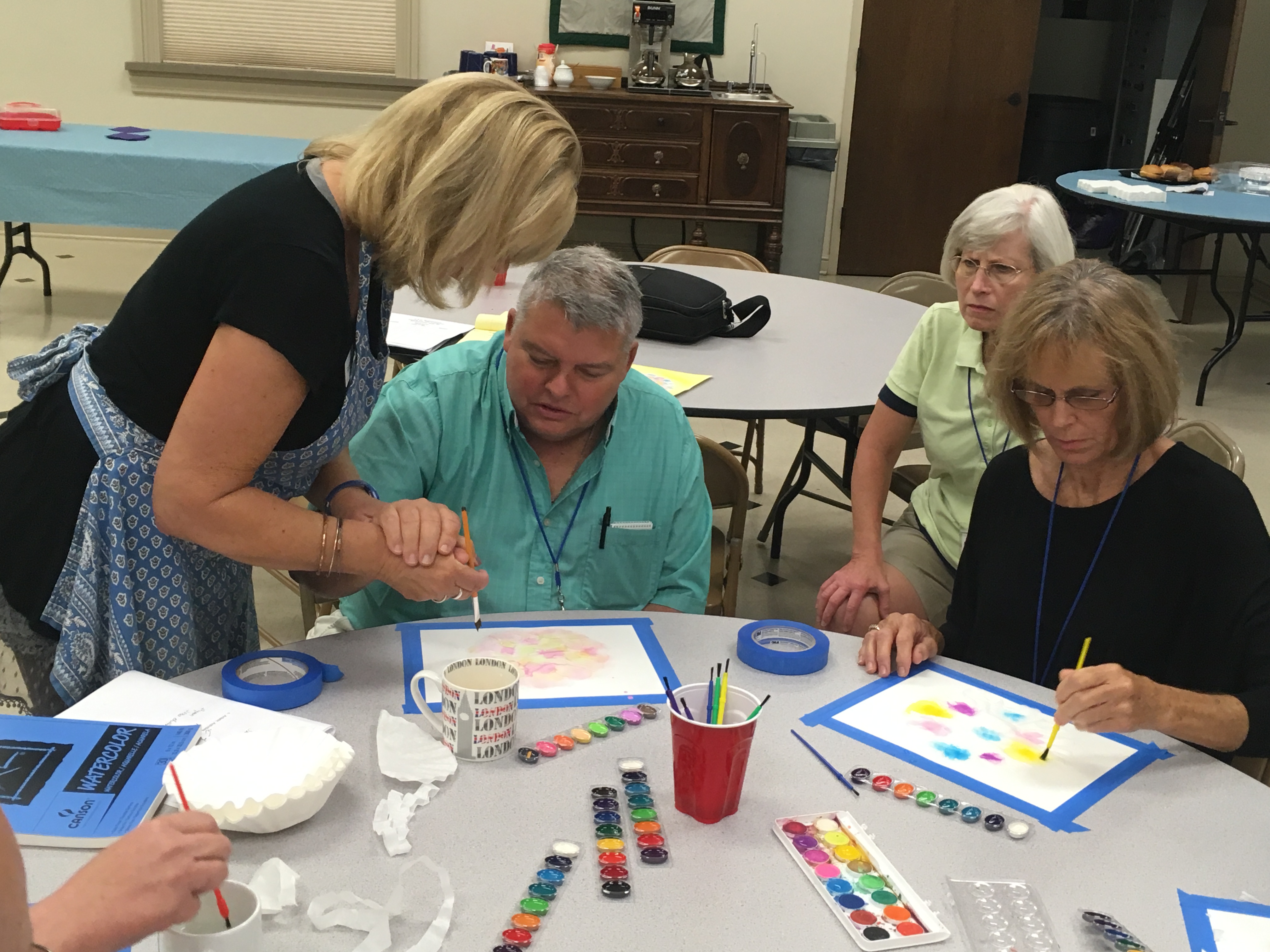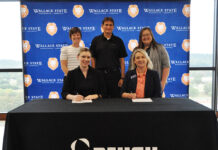Robin Dill demonstrates how volunteers can help patients paint, even if they can’t hold a paintbrush. (W.C. Mann for The Cullman Tribune)
CULLMAN – Grace Episcopal Church’s Grace Place (GP) has for months now offered two opportunities a week for caregivers to leave their loved ones in a safe and stimulating environment while they take some needed break time for themselves. This week, the ministry took the additional step of hosting Caring for the Caregiver, a two-day event that offered training to dementia ministry volunteers, while equipping and encouraging full-time caregivers.
In an earlier message to The Tribune, GP Director, Deacon Jerry Jacob explained, “A caregiver at some point in the process of the disease becomes a 24/7 (24 hours a day, 7 days a week) attendant for their loved one. Different people with memory loss progress at different rates. Currently what is known is that dementia may develop undetected and/or undiagnosed for as long as 12 to 20 years. And, right now, there are no therapies or medications to reverse the effects.
“What is also almost universally accepted is that caregivers are prone to unknowingly sacrifice their own health in trying to care for their loved one. There is a compelling need to equip family-member caregivers with ways in which they can equip themselves with avenues to find respite.”
Robin Dill, founder and former director of Grace Arbor in Lawrenceville, Georgia, a respite day program for people with memory loss, led the event. On Wednesday morning and afternoon, she led training sessions for a dozen GP volunteers, showing them how to do activities that engage the participants in ways they can respond to, and how to help the participants find spiritual meaning in those activities.
During a break time in Wednesday’s volunteer training, Dill shared, “Today, the volunteers are going through a training that I’ve created called ‘A Patchwork of Activities.’ They’re getting some knowledge about how you do activities with people with dementia, why you do them a certain way; then they’re going to be doing those particular activities to see what it feels like and experience it.
“People with dementia are in brain failure. Their brains are not working like your brain and my brain are. So, to be able to process through activities- and we’re doing activities all day long, our life is full of activities- so for somebody with dementia who maybe forgets how to do something or why something is done a certain way, if we can understand what’s going on in their brain and how to present activities in a way they can be successful, it will help the caregiver and the people (they care for) to have decreased behaviors, decreased anxiety, increased participation, increased engagement. They’re not bored stiff, they’re not sleeping in a corner, they’re not asking ‘Is it time to go home?’ They’re engaged in activities that are successful and that are purposeful.”
On Wednesday afternoon, Jacob said, “What is dawning on us is the activities we’re lacking here, even though we observed the other places. We didn’t have this kind of detailed information that she’s providing, and to take what she’s experienced in her program before- the step-by-step approach and one step at a time, which is what you need to do with folks with memory loss. But also, the passion she has for what she’s doing.
“She was here yesterday with just our regular session. And the first comment she made, which was not a gratuitous comment, was ‘You people, the volunteers, love these people in a very real way. You’re kind with them, you’re gentle with them, you’re encouraging with them. You’re showing God’s love to these folks. And I didn’t recruit these people; these people came on their own, and it shows.
“So we’ve got the perfect base to start with. We just need the techniques to implement these kinds of things. That’s number one. Number two is, it’s also dawning on us that we’re not doing what we need to be doing for the caregivers. Hence the sessions tonight and tomorrow.”
Dill’s sessions on Wednesday evening and Thursday morning drew 56 caregivers. Participants learned about how to communicate effectively with physicians and others, in order to get things done for their loved ones, and about ways to communicate their own needs to other family members, friends and counselors. And, most importantly for some, they got the opportunity to share their own fears and frustrations among a group of people who understood and could sympathize with them. By the end, Dill stepped away from the podium to get face to face with audience members, and even a few hugs became part of the program.
Looking ahead
In addition to its ministry to dementia patients which offers caregivers a few hours respite each week, GP also offers an evening caregivers’ support group. Jacob revealed that one of GP’s long-term goals is the creation of an expanded support program for caregivers.
Said Jacob, “First of the year, Bill Strandlund’s going to be heading (the dementia patients’ program) up, and I’m going to be heading up part of the caregiver support. And that’s going to include a daytime caregiver support group.
“I’m going to get some training. We’ve got a lot of resource information that we can provide people, but I want to give people that are caregiving two things. One is to know that somebody cares about them deeply and understands what they’re facing. And the second thing is ‘Now you tell us what you need to help you: whether that’s a chance to sit here and vent, a chance to sit here and share stories with other caregivers, a chance to learn about what resources are available. What do you need? Don’t let me tell you what you need; you tell us what you need.’”
Jacob said that the caregiver support ministry will not only be for those caring for dementia patients, but also for all caregivers, including those caring for the elderly and those with special needs. He hopes that this program will be able to reach out to other local churches, so that caregivers from all over the area will be able to find the support they need in their own congregations in addition to GP.
Jacob expressed deep compassion for caretakers of patients with all types of conditions, and also expressed the hope that the faith communities around them will be able to increase their efforts to help as they are equipped to respond.
“They are facing hell,” said Jacob, “and they feel alone, they feel isolated, they feel that nobody cares about them; because nobody calls on them, nobody wants to be around their person with the memory loss, because ‘I don’t know what to say. I don’t know what to do.’ Well, we can help you figure out what to do, but you’ve got to do it.”
Jacob also hopes that Caring for the Caregiver will become an annual event, bringing in multiple authorities on topics related to dementia and caregiving.
Dill said, “This kind of ministry is a lifeline to families dealing with dementia. They can be the difference between a caregiver throwing up their hands and saying, ‘I’m done,’ to ‘Okay, I can do this because I’ve got a group of people that are walking this journey with me and supporting me in this stage of the journey.’”
For more information on Robin Dill’s programs, visit https://rdillblogwalkingwithgrace.wordpress.com. Her “Walking with Grace” books are available through Amazon and other book distributors.
For more information on Grace Place’s memory loss ministry and caregiver support opportunities, visit www.facebook.com/305ArnoldStreetNE/ or contact Deacon Jerry Jacob at dcnjacob@gmail.com, 256-736-4260 or 256-338-6556.
Copyright 2018 Humble Roots, LLC. All Rights Reserved.



























